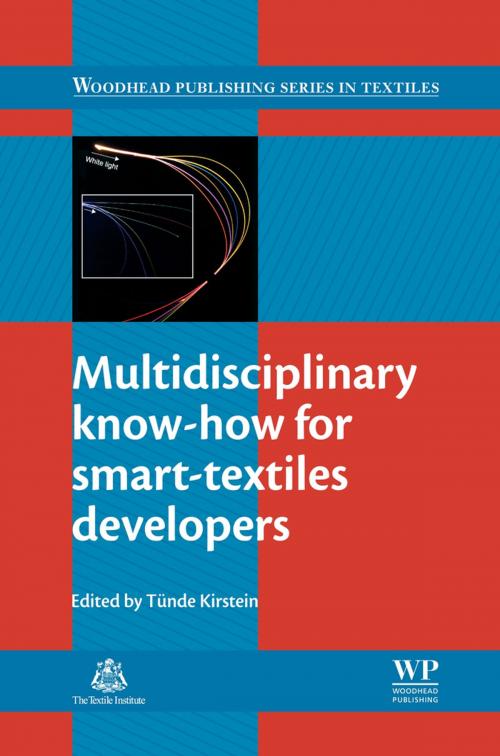Multidisciplinary Know-How for Smart-Textiles Developers
Nonfiction, Science & Nature, Technology, Textiles & Polymers, Material Science| Author: | ISBN: | 9780857093530 | |
| Publisher: | Elsevier Science | Publication: | April 4, 2013 |
| Imprint: | Woodhead Publishing | Language: | English |
| Author: | |
| ISBN: | 9780857093530 |
| Publisher: | Elsevier Science |
| Publication: | April 4, 2013 |
| Imprint: | Woodhead Publishing |
| Language: | English |
Smart-textiles developers draw on diverse fields of knowledge to produce unique materials with enhanced properties and vast potential. Several disciplines outside the traditional textile area are involved in the construction of these smart textiles, and each individual field has its own language, specific terms and approaches. Multidisciplinary know-how for smart-textiles developers provides a filtered knowledge of these areas of expertise, explaining key expressions and demonstrating their relevance to the smart-textiles field.
Following an introduction to the new enabling technologies, commercialisation and market trends that make up the future of smart-textiles development, part one reviews materials employed in the production of smart textiles. Types and processing of electro-conductive and semiconducting materials, optical fibres for smart photonic textiles, conductive nanofibres and nanocoatings, polymer-based resistive sensors, and soft capacitance fibres for touch-sensitive smart textiles are all discussed. Part two then investigates such technologies as the embedding of electronic functions, the integration of thin-film electronics, and the development of organic and large-area electronic (OLAE) technologies for smart textiles. Joining technologies are also discussed, alongside kinetic, thermoelectric and solar energy harvesting technologies, and signal processing technologies for activity-aware smart textiles. Finally, product development and applications are the focus of part three, which investigates strategies for technology management, innovation and improved sustainability, before the book concludes by exploring medical, automotive and architectural applications of smart textiles.
With its distinguished editor and international team of expert contributors, Multidisciplinary know-how for smart-textiles developers is a key tool for readers working in industries including design, fashion, textiles, through to electronics, computing and material science. It also provides a useful guide to the subject for academics working across a wide range of fields.
- Reviews materials used in the production of smart textiles
- Examines the technologies used in smart textiles, such as optical fibres and polymer based resistive sensors
- Investigates strategies for technology management, innovation and improved development
Smart-textiles developers draw on diverse fields of knowledge to produce unique materials with enhanced properties and vast potential. Several disciplines outside the traditional textile area are involved in the construction of these smart textiles, and each individual field has its own language, specific terms and approaches. Multidisciplinary know-how for smart-textiles developers provides a filtered knowledge of these areas of expertise, explaining key expressions and demonstrating their relevance to the smart-textiles field.
Following an introduction to the new enabling technologies, commercialisation and market trends that make up the future of smart-textiles development, part one reviews materials employed in the production of smart textiles. Types and processing of electro-conductive and semiconducting materials, optical fibres for smart photonic textiles, conductive nanofibres and nanocoatings, polymer-based resistive sensors, and soft capacitance fibres for touch-sensitive smart textiles are all discussed. Part two then investigates such technologies as the embedding of electronic functions, the integration of thin-film electronics, and the development of organic and large-area electronic (OLAE) technologies for smart textiles. Joining technologies are also discussed, alongside kinetic, thermoelectric and solar energy harvesting technologies, and signal processing technologies for activity-aware smart textiles. Finally, product development and applications are the focus of part three, which investigates strategies for technology management, innovation and improved sustainability, before the book concludes by exploring medical, automotive and architectural applications of smart textiles.
With its distinguished editor and international team of expert contributors, Multidisciplinary know-how for smart-textiles developers is a key tool for readers working in industries including design, fashion, textiles, through to electronics, computing and material science. It also provides a useful guide to the subject for academics working across a wide range of fields.
- Reviews materials used in the production of smart textiles
- Examines the technologies used in smart textiles, such as optical fibres and polymer based resistive sensors
- Investigates strategies for technology management, innovation and improved development















